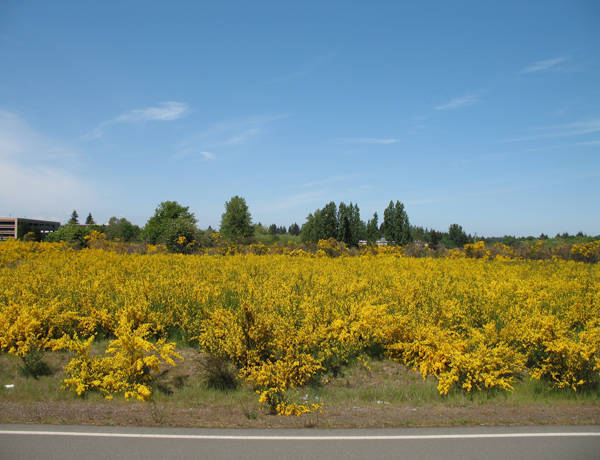Submitted by the San Juan County Noxious Weed Control Program.
In partnership with the Washington Invasive Species Council, Gov. Jay Inslee signed a proclamation recognizing the week of February 24 as Invasive Species Awareness Week in Washington State.
“We are fortunate to live in a state filled with natural beauty and abundant natural resources,” Inslee said. “To keep it that way, we all must do our part to prevent harmful plants and animals not found in Washington from settling here. Nationally, invasive species pose a $137 billion threat to crops, wildlife and forests.”
The week includes opportunities for people to learn how to prevent the spread of invasive plants and animals in their everyday lives. For example, people are encouraged to clean their boats and other equipment before going to a new lake or river, and to buy firewood close to where they’ll burn it. Families can learn how to finding new homes for unwanted pets rather than letting them loose outdoors.
“In Washington, people spend an estimated $26 billion on outdoor recreation, which puts nearly 200,000 people to work in living-wage jobs every year,” said Kaleen Cottingham, director of the Washington State Recreation and Conservation Office, which houses the Washington Invasive Species Council. “As an organization that invests in the outdoors, we know the risk invasive species pose to our environment and the communities that depend on it. That’s why this week is important. We hope more people will understand what’s at stake and will join the hundreds of other folks in doing their part to prevent the spread of invasive species.”
Washington State has a comprehensive strategy for dealing with dozens of invasive plants and animals, including an aggressive prevention effort.
“As the agency primarily responsible for ensuring healthy fish, wildlife and habitat for Washington, we need to stop aquatic invasive species with the help of people and partners around the state,” said Kelly Susewind, director of the Washington Department of Fish and Wildlife. “Prevention is less expensive and far more effective than trying to remove invasive species once they arrive.
“Washington state benefits from well-managed, resilient forests that create natural resources and recreation jobs, wildlife habitat and clean water,” said Hilary Franz, public lands commissioner. “Invasive species such as gypsy moths and emerald ash borers can decimate those forests. Healthy forests support healthy communities and we should all do our part to protect both.”
“Invasive species threaten almost half of native species listed as federally endangered, including salmon,” said Guy Norman, member of the Northwest Power and Conservation Council. “Northern pike are an invasive fish right on the border of vital salmon spawning habitat. If we don’t stop their spread, it would be devastating to our endangered salmon and the species that depend upon them, like orca whales.”
People can take simple actions to help prevent the introduction and spread of noxious weeds and other invasive species by doing the following:
• Before venturing outdoors, clean hiking boots, bikes, waders, boats and trailers, off-road vehicles and other gear to stop invasive species from hitching a ride to a new location.
• Watch for noxious weeds. Visit the Washington State Noxious Weed Control Board’s website https://www.nwcb.wa.gov/ to learn about noxious weeds. Residents who spot any in their yards or while walking in their neighborhoods should notify the county noxious weed control board.
• Download the “WA Invasives” mobile app to report sightings of invasive species. Check out the Top 50 worst invaders.
• Dispose of unwanted pets, aquarium plants or water, science kits or live bait the proper way and NOT by dumping them into waterways. Released pets often suffer a slow death in winter, or may become invasive and damage other wildlife and agriculture. When it comes to unwanted pets or live bait, letting it loose is never the right thing to do. Visit the council’s Don’t Let It Loose Web page to learn the proper ways to dispose of unwanted pets and plants.
• Campers should buy firewood where they’ll burn it, or gather it on site when permitted. Don’t move firewood from the local area where harvested. Visit the WISE Web site to learn about the potential dangers of moving firewood or the council’s education campaign.
• Enjoy catching salmon and steelhead? Protect them by not moving any fish from one waterbody into another. This will prevent the spread of fish diseases while protecting salmon and steelhead fisheries from non-native predatory fish. Visit the Department of Fish and Wildlife’s website https://wdfw.wa.gov/licensing/fish_transport/transport_app.html to learn more about and restrictions around moving fish.
• Use weed-free certified forage, hay or mulch. Visit the Washington Department of Agriculture website https://agr.wa.gov/PlantsInsects/WWHAM/WWHAM.aspx to see details of its certification program.
• Plant only non-invasive plants in your garden, and remove any known invasive plants.
• Volunteer to survey public lands and trails as a Citizen Science Invasive Plant Monitor with the Pacific Northwest Invasive Plant Council.
• Become a Washington State University master gardener and help your community identify, report and properly manage exotic and invasive pests. Read details of the program here: http://mastergardener.wsu.edu/
• Volunteer to help remove invasive species from public lands and natural areas. Contact local parks and recreation departments or county Washington State University Extension office to learn more.
• Don’t pack a pest. Certain items obtained abroad may contain invasive insects, viruses or weed seeds. When traveling abroad, review travel guidelines on items that should not be brought back to the United States.
“Simple, coordinated actions taken by everyone in Washington will save our agriculture, natural resources, wildlife and outdoor recreation economy,” Cottingham said. “Let’s all do our part to protect the state we love.”




